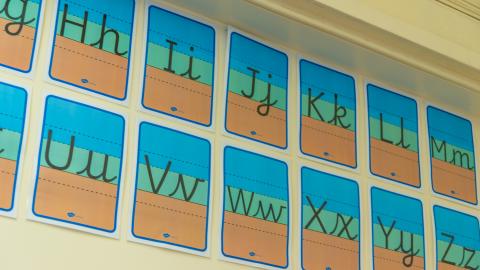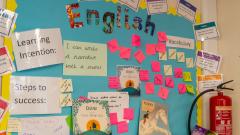Within the White Rose Federation, we:
- Follow the accredited Bug Club Phonics programme, which provides a systematic teaching plan, bespoke resources, a thorough assessment schedule, and online resources for small group and whole class teaching.
- Deliver daily morning phonics lessons in Reception and Year 1 to ensure that Phonics teaching is prioritised. These follow the same lesson structure each day, as outlined by Bug Club: recall and learning of grapheme-phoneme correspondences, blending to read words with a particular grapheme, segmenting to spell the same words, and sentence writing incorporating rehearsal of spelling with the same grapheme, learning, and recalling of tricky words and other relevant spelling and grammatical features.
- Our programme follows this pattern:
- The development of aural skills is taught through in the moment teaching and continuous provision throughout the first two terms of the Foundation Stage 1 (Nursery 2) year.
- We begin the teaching single letter graphemes in the last half term of the Foundation Stage 1 (Nursery 2) year.
- Single letter graphemes, alongside digraphs and trigraphs are taught in the first half of the Reception year.
- Consonant blends in words are taught alongside a recap of single letter graphemes, digraphs and trigraphs throughout the remainder of the Reception year.
- Alternative spellings of phonemes are taught throughout Year 1. We allow class teachers the freedom to cover these graphemes in the order they wish, to suit the learning of their children.
- Once children are secure within the Bug Club programme, they transition to the Babcock spelling programme, as taught to Year 2 and beyond.
- Monitor the planning, teaching, and assessment to ensure Phonics is of a high quality and consistent across the school.
- A holistic approach to Phonics teaching, which looks for opportunities to incorporate and embed the practice of Phonics skills throughout the day. For example, the linking of Phonics sessions with English lessons, alongside plenty of chances for pupils to apply their Phonics in cross-curricular writing in the afternoon sessions.
- Use of paired work to ensure that every child is focused during every moment of a Phonics lesson. Typically, this will mean the children testing one another out on GPC recognition, working with a partner to read and write words and so on. Working pairs are also differentiated, with a high attaining pupil placed with a lower attaining pupil, in order that support is on hand at every moment.
- Daily formative assessment to ensure that Phonics teaching is clearly matched to the needs of learners and that gaps in learning are quickly identified and addressed the very next day.
- Summative assessments conducted in line with the Bug Club assessment schedule, to capture pupils’ GPC recognition and blending and segmenting ability.
- Monitoring of Phonics progress incorporated into half termly pupil progress meetings with Heads of Schools.
- Daily interventions in place for any pupils who are falling behind in their Phonics attainment.
- A supportive learning environment, with displays and table prompts showing sounds and key words from the Bug Club scheme. Grapheme charts displayed clearly in every Early Years classroom and smaller, table-top versions available for support in lessons.
- Parent information evenings, typically delivered in September, to introduce parents to our Phonics teaching programme, and in January, to instruct Year 1 parents how to support at home with preparation for the Phonics screening check.
- Regular training for EYFS staff, led by English lead, in the teaching of Phonics.
Reading (KS1)
Within the White Rose Federation, we will implement:
- Daily story time in class, focused on the enjoyment of a text for its own sake. During this time, teachers use natural opportunities to highlight authors, ask inferential questions, point out key spellings and textual features, and model the love of reading.
- Regular opportunities for children to read one to one with adults in school. In Reception and Key Stage 1, all children will read to an adult at least once every week. Every class will have a Reading file, and adults reading with the children record key findings in the file.
- Every child from Reception to Year 2 takes home at least one reading book a week, along with a reading record, to encourage parents to write down sessions at home. Class teachers are responsible for ensuring that these reading books are at a suitable level for each child.
- Reading books are phonetically pure in line with the child’s Phonics attainment (Bug Club), and these books are supplemented by equivalent titles from other publishers, to promote the love of reading. Bug Club books are matched to the teaching sequence of the Phonics programme and will match the sounds and words each child is currently learning. The children should be able to decode the words by sounding out and blending, and not by using the pictures. The children also have an online Bug Club account, which is monitored by teachers on a weekly basis.
- Curriculum planning and English planning are text driven, and class teachers in Early Years and Key Stage 1 are given the freedom and encouraged to choose books which are liked and enjoyed by their class. If the chosen text proves to be uninteresting to them, the class teacher has the freedom to and is encouraged to change direction immediately and find a replacement.
- The planning and delivery of high quality, whole class guided reading sessions, to ensure comprehension skills are taught rigorously and consistently across the school. In Reception, children are taught three times a week for ten minutes as a whole cohort. In Key Stage 1, children are taught three times a week for thirty minutes (Year 1) and sixty minutes (Year 2) as a whole cohort. A different skill is focused on each time, including: vocabulary, inference, prediction, retrieval and sequencing.
- Monitoring of the planning, teaching and assessment to ensure reading is of high quality and consistent across the school.
- Ongoing formative assessment of every child during their weekly read with an adult will ensure their ‘Phonics Reader’ is clearly matched to their ability and their comprehension skills are developing. Those experiencing difficulty decoding will be supported through phonics intervention and more frequent opportunities to read with an adult in school.
- A reading area in each Early Years and Key Stage 1 class, which is designed to promote the love of reading. Displays focus on the children’s own favourite texts and incorporate their thoughts, feelings and questions about literature they have read. Books are carefully selected to include a range of genres and styles, and we deliberately include only a few titles at a time, so that the younger pupils can clearly see what’s on offer when they choose to read.


